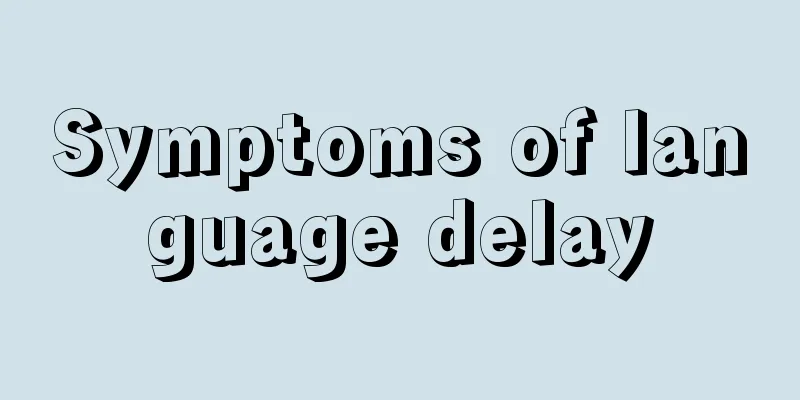Symptoms of language delay

|
Speaking is the biggest part of our communication, but a small number of people suffer from developmental delays or even failure to develop language during their development. The delayed development of our central language system may be due to internal reasons such as intelligence, hearing and brain diseases, as well as a poor language environment. The main symptom is that they cannot speak independently or put words together at the age when they should be speaking, and they are much slower than normal children. Causes Factors such as mental retardation, hearing impairment, articulation organ diseases, central nervous system diseases, and poor language environment are all common causes of delayed language development in children. Clinical manifestations Idiopathic language development disorders are clinically divided into two types: expressive language disorders and receptive language disorders. The former can understand language but cannot express it, while the latter has limited understanding and expression of language. When the child begins to learn to speak, language defects will be revealed. The child can make some syllables but cannot form words. He cannot remember common words, his vocabulary is very poor, and he cannot use complete sentences to describe what he needs, so his sentences are very difficult to understand. Children with this disease learn language very slowly, often 2 to 3 times slower than normal children, and their language skills are obviously delayed. For example, they may not be able to call dad or mom at the age of one, and may not be able to speak complete sentences at the age of four. Children with idiopathic language development disorder may not have obvious psychological and emotional abnormalities in the preschool stage, and remain lively and happy. After going to school, due to difficulties in language communication, children often have behavioral problems such as anxiety, depression, withdrawal, and disobedience. These children often have learning difficulties, mainly difficulties in reading, comprehension and calculation. Since these children have normal inner language development, they can participate in some creative games and draw. Have certain interpersonal skills, such as using facial expressions and actions to express one's needs. He can show attachment to his mother and play with other children. When the children were given intelligence tests, the verbal part was poor, but the operational part was normal, showing a dissociation between verbal IQ and operational IQ. diagnosis Children with receptive language disorders have poor comprehension and expression of oral language. The child is unable to understand simple instructions and cannot point to or get an object in response to verbal instructions. Children with this disease can hear sounds but do not understand language, and will respond to gestures and facial expressions. Although the hearing test showed mild hearing loss, it was extremely disproportionate to the lack of response to language seen clinically. The hearing curve of electrical audiometry is often very unstable and fluctuates greatly. |
<<: What are the causes of asymptomatic fever
>>: What is the most effective way to slim down the masseter muscles on the face?
Recommend
What is the prognosis of unilateral resection of thyroid cancer?
Thyroid cancer is a common endocrine tumor in cli...
What causes sudden pain in the back of the head?
We all know that the structure of the human brain...
The difference between bivalent, quadrivalent and nonavalent cervical cancer vaccines
Cervical cancer vaccines are divided into bivalen...
This symptom is actually fungal esophagitis
Fungal esophagitis is caused by infection with Ca...
Knee repair action
The knee is one of the important joints in the hu...
What are the benefits of toad fur? Let me show you the correct usage
Toad fur grass is native to plateau areas, and is...
Which is better, acacia honey or vitex honey?
Everyone is familiar with honey. Whether it is dr...
How to tell if a girl is a virgin?
In ancient times, men generally had a strong virg...
Symptoms of foot fracture
The parts of the body most prone to fractures are...
Can people with teratoma do yoga?
Can I do yoga if I have a teratoma? Teratoma is a...
What is hypoglycemia reaction
Many people have experienced hypoglycemia. Hypogl...
The efficacy and function of licorice oil
Licorice oil is a common medicine. We usually bri...
Will chronic pharyngitis cause bleeding
There are many patients with pharyngitis in our l...
The effect of vinegar on the liver
I believe that everyone comes into contact with v...
Can sit and forward bend help you grow taller
Sit-and-reach exercise is a stretching exercise t...









